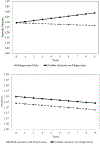Longitudinal Cognitive Profiles by Anxiety and Depressive Symptoms in American Older Adults With Subjective Cognitive Decline
- PMID: 34342395
- PMCID: PMC8599627
- DOI: 10.1111/jnu.12692
Longitudinal Cognitive Profiles by Anxiety and Depressive Symptoms in American Older Adults With Subjective Cognitive Decline
Abstract
Purpose: The objective of this study was to determine how anxiety and/or depressive symptoms differentially affect specific cognitive domains over time in persons with subjective cognitive decline (SCD).
Design: A longitudinal, observational study was conducted using data from the National Alzheimer's Coordinating Center-Uniform Data Set. Mean follow-up was 4.1 ± 2.4 years.
Methods: Using information from a total of 1401 participants (age 74.0 ± 8.2 years), linear mixed-effects regression models were used to assess longitudinal changes in global cognition, episodic memory, attention, language, and executive function by baseline psychological (anxiety [A] and/or depressive [D]) symptoms in individuals with SCD. Reference was the group having no symptoms (A-/D-).
Findings: The A+/D- group was not associated with any cognitive changes. The A-/D+ group was associated with a greater decline in episodic memory and executive function. The A+/D+ group had a greater decline in attention. Changes in global cognition and language were not predicted by any psychological symptoms.
Conclusions: Depressive symptoms predicted lower episodic memory and executive function.
Clinical relevance: Nurses need to pay attention to depressive symptoms in older adults with SCD because managing depressive symptoms may help protect against cognitive decline more typical of early Alzheimer's dementia.
Keywords: Alzheimer's dementia; depressive symptoms; episodic memory; executive function; subjective cognitive decline.
© 2021 Sigma Theta Tau International.
Figures


References
-
- Alzheimer’s Association. (2019). 2019 Alzheimer’s disease facts and figures. Alzheimer’s & Dementia, 15(3), 321–387. - PubMed
-
- Arnett JA, & Labovitz SS (1995). Effect of physical layout in performance of the Trail Making Test. Psychological Assessment, 7(2), 220–221.
Publication types
MeSH terms
Grants and funding
- P50 AG005142/AG/NIA NIH HHS/United States
- P50 AG016573/AG/NIA NIH HHS/United States
- P50 AG047266/AG/NIA NIH HHS/United States
- P30 AG010161/AG/NIA NIH HHS/United States
- P50 AG025688/AG/NIA NIH HHS/United States
- P50 AG005133/AG/NIA NIH HHS/United States
- P50 AG005138/AG/NIA NIH HHS/United States
- P30 AG072977/AG/NIA NIH HHS/United States
- P50 AG047366/AG/NIA NIH HHS/United States
- P30 AG010129/AG/NIA NIH HHS/United States
- P30 AG019610/AG/NIA NIH HHS/United States
- P30 AG028383/AG/NIA NIH HHS/United States
- P50 AG033514/AG/NIA NIH HHS/United States
- P30 AG013854/AG/NIA NIH HHS/United States
- P30 AG053760/AG/NIA NIH HHS/United States
- P30 AG072975/AG/NIA NIH HHS/United States
- P30 AG066444/AG/NIA NIH HHS/United States
- P30 AG010124/AG/NIA NIH HHS/United States
- P50 AG023501/AG/NIA NIH HHS/United States
- P50 AG005131/AG/NIA NIH HHS/United States
- P30 AG010133/AG/NIA NIH HHS/United States
- P50 AG016574/AG/NIA NIH HHS/United States
- P50 AG005146/AG/NIA NIH HHS/United States
- U24 AG072122/AG/NIA NIH HHS/United States
- P30 AG035982/AG/NIA NIH HHS/United States
- P50 AG008702/AG/NIA NIH HHS/United States
- U01 AG016976/AG/NIA NIH HHS/United States
- P30 AG008051/AG/NIA NIH HHS/United States
- P50 AG005681/AG/NIA NIH HHS/United States
- P30 AG013846/AG/NIA NIH HHS/United States
- P50 AG047270/AG/NIA NIH HHS/United States
- P50 AG005136/AG/NIA NIH HHS/United States
- P30 AG049638/AG/NIA NIH HHS/United States
- P30 AG012300/AG/NIA NIH HHS/United States
- P50 AG005134/AG/NIA NIH HHS/United States
- P30 AG008017/AG/NIA NIH HHS/United States
LinkOut - more resources
Full Text Sources
Medical

